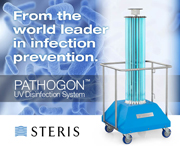
Jamie Morgan, Health Facilities ManagementCrestwood Medical Center identified four areas of improvement in environmental hygiene and operating room turnover time.
|
Heather Punke, Becker’s Hospital ReviewThe following is a list of hospitals in Pennsylvania for which 84 percent or more patients reported that their room and bathroom were "always" clean on their HCAHPS surveys.
|
Karen Kroll, Facilities NetMany facility managers point to the lip along the bottom of a traditional shower stall as a prominent tripping hazard, as well as another seam where moisture and bacteria can hide.
|
Healthcare Facilities TodayIn a recent Q&A on the FacilityCare website, consultant Brad Keyes answered a question about storage in a corridor.
|
Jamie Morgan, Health Facilities ManagementIt takes time and money to make things happen, and that certainly proves true when examining the results of our 2015 Sustainable Operations Survey.
|
Shannon Barnet, Becker’s Hospital ReviewNo longer simply a place to heal sick people, many hospitals across the nation have taken on the responsibility of being a beacon of health in their respective communities by reducing their environmental footprint.
|
The National Law ReviewOn September 25, 2015, the Environmental Protection Agency (EPA) published a proposed rule altering the regulatory regime governing the handling and disposal of hazardous waste pharmaceuticals generated at health care facilities and managed at pharmaceutical reverse distributors.
|


CDC via Infection Control TodayThe National Center for HIV/AIDS, Viral Hepatitis, STD, and TB Prevention (NCHHSTP) Atlas is an innovative and interactive, online data tool that lets you use and analyze the most recent CDC surveillance data on HIV, hepatitis, STDs, and tuberculosis.
|
CDC via Infection Control TodayContamination of the skin and clothing of health care workers happened frequently during the removal of gloves or gowns in a simulation study published by JAMA Internal Medicine that used fluorescent lotion and black light.
|
CDC via Infection Control TodayAcinetobacter baumannii can cause serious health-care-associated infections (HAIs) and the incidence is increasing, with many strains now resistant to multiple antibiotic classes.
|
Society for Healthcare Epidemiology of America via Infection Control TodayThe number of infections caused by highly antibiotic-resistant extended-spectrum beta-lactamase (ESBL)-producing Escherichia coli ( E. coli) bacteria is increasing in community hospitals, a setting in which most Americans receive care, according to a new study published online in Infection Control & Hospital Epidemiology.
|
Xenex via Infection Control TodayPulsed xenon technology has been shown to work in a lab setting, but it is also supplementing manual cleaning and making a difference in the health care environment. This report summarizes recent studies that have examined pulsed xenon technology.
|
University of Pennsylvania School of Medicine via Infection Control TodayRobots are capable of all sorts of tasks to help better treat cancer: They connect oncologists to patients remotely, make incisions, staple them shut, deliver "nano" therapies – and they clean rooms.
|
Paul Merrild, Harvard Business ReviewIt’s impossible to visit the battlefield of Gettysburg without being deeply moved. The Union and Confederate armies together suffered more than 50,000 casualties during the three-day battle.
|
Stephanie Vozza, Fast CompanyThere is no shortage of advice that is meant to help you get more done in less time.
|
Thursday, October 29th, 1:00 p.m. ET, 12:00 p.m. CT, 10:00 a.m. PTIn this webinar, we’ll discuss how Integrated Pest Management can play a role in your sustainability initiatives, help reduce reliance on chemical treatments, and work to provide a healthier environment for patients – all while fighting pests. We will also address the most common health care pests, including ants, bed bugs and flies, and what you can do to help prevent them.
|
Event Date: Tuesday, October 20, 2015, at 12 CT/1 p.m. ETThe single overriding mission of every health care provider is to ensure the best possible patient care. The key to achieving that mission is the people who provide the care—an incredibly diverse mix of traditional FTEs and contingent travelers, per diem, hourly and contract staffers. Sourcing, engaging and managing contingent labor in this complex health care workforce requires a continually increasing level of management focus and operational resources.
|
MyAHE is our branded members-only discussion forum. On MyAHE, you can ask your most pressing environmental services related questions or answer questions posed by other professionals.
|
October 8–November 20, 2015AHE invites those interested in presenting at its EXCHANGE 2016 to submit a proposal for review by the Conference Planning Committee.
|
AHE via CDCOn September 11, 2015, CDC issued HAN 00382 alerting health care providers and facilities about the public health need to properly maintain, clean, and disinfect or sterilize reusable medical devices.
|
If interested in contributing to EXPLORE by authoring a best-practices article, email Heather Williams, EXPLORE editor, for more information. The magazine covers all aspects relevant to health care environmental services professionals.
|

John Scherberger, BS, CHESP, REH, EXPLORE magazineIt’s been said environmental services professionals interact with patients as much as nursing staff, and often times more so. Regardless of one’s opinion, it’s a fact both professions render a special kind of treatment and care. Keep in mind that treatment and care are not synonymous, yet both are absolutely essential to patients.
|
Colby C. Morris, CHESP, EXPLORE magazineThere is a constant in health care that applies to us all, and it certainly will not change—training and ongoing education. This and the engagement of our staff in those activities are those areas where we’re continuously trying to stay on top of tracking, pushing, completing, and coaching.
|
Product Spotlights
|
| |
|

